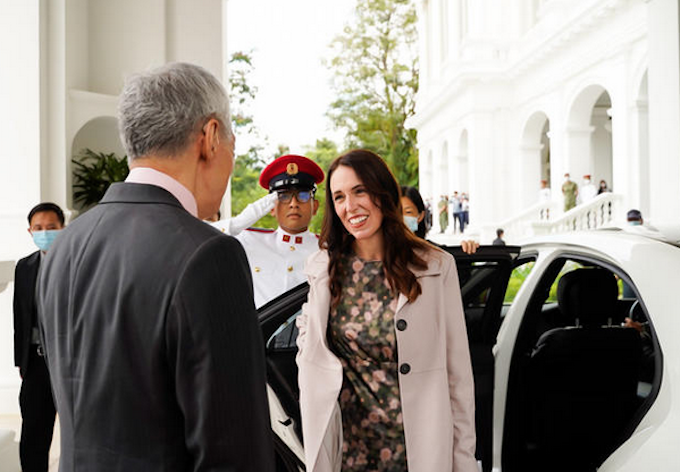
By Russell Palmer, RNZ News digital journalist
Prime Minister Jacinda Ardern and her Singaporean counterpart Lee Hsien Loong have added a focus on climate and sustainability to the enhanced relationship between the two countries.
Speaking after bilateral talks in Singapore, the pair jointly announced a fifth pillar would be added to the agreement on the New Zealand-Singapore Enhanced Partnership.
They announced the initial enhanced partnership in 2019 during Ardern’s last official visit, with the four pillars of trade and economics; security and defence; science, technology and innovation; and people-to-people links.
- READ MORE: Other New Zealand and Singapore trade reports
- China and Solomon Islands sign security pact
The fifth pillar added today will be “climate change and the green economy”.
Ardern said given the existential threat posed by climate change, it was fitting.
“When it comes to climate change this is not an area where countries are seeking to be competitive, or we shouldn’t be seeking to be competitive unless the competition is who can reduce emissions the fastest.
“Globally we have entered what must be an age of action, and that includes the private sector as well. No government can do this alone.”
Call for stronger global cooperation
Lee echoed that sentiment, calling for stronger global cooperation on climate change.
“Climate change is the existential challenge of our times … we need stronger cooperation among most countries.”
He said areas that could be worked on included workshops for building joint capacity in responding to climate change, improved pricing for emissions trading, and work on sustainable aviation initiatives.
“Aviation is one of the major sources of carbon emissions … and New Zealand is at the end of the world and Singapore is not so close to Europe either.
“If we are going to call for a low-carbon world this is something we should be focused on.”
Ardern said Singapore was a trade hub which 20 percent of New Zealand’s exports funnelled through, and there were opportunities in reducing emissions for both shipping — including hydrogen fuel — and food, including research into urban farming.
Ardern’s trade delegation to Asia — including Trade Minister Damien O’Connor, officials, a dozen business people and media — landed in Singapore last night.
They travel to Japan tomorrow for a three-night stay, although three members of the roughly 50 people returned weak positive covid-19 test results today, believed to be from previous infections.
Because of Japan’s entry rules, they will not be allowed to enter.
Regional cooperation, defence and trade
Asked about the increasing influence of China in the Asia-Pacific region, Ardern said China had acknowledged the effects of Russia’s war on Ukraine, and Lee saying Singapore was unaware of the details of agreement between China and the Solomon Islands.
They expressed concern that the war in Ukraine could lead to increased protectionism in the region however, and reiterated their shared commitment to an “open, inclusive, rules-based and resilient Indo-Pacific region”, including free trade, open markets, and respect for countries’ sovereignty.
Lee also said they welcomed interest from other countries including China and Korea in joining the Digital Economy Partnership Agreement, an agreement signed in 2020 between New Zealand, Singapore and Chile.
The agreement aims to support digital economies and trade, and guarantees cooperation on digital identity, policies, emerging technologies, data protection and digital products.
They said they also welcomed the efforts of the United States in pursuing an Indo-Pacific Economic Framework.
This article is republished under a community partnership agreement with RNZ.













































